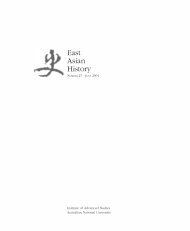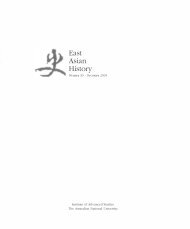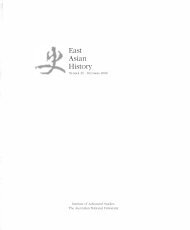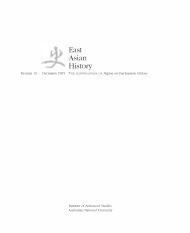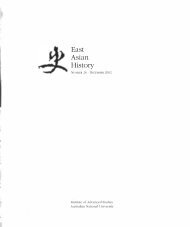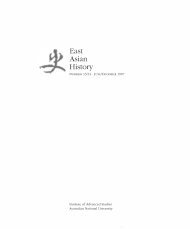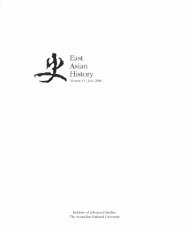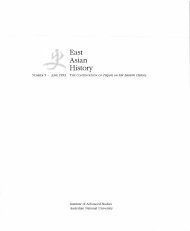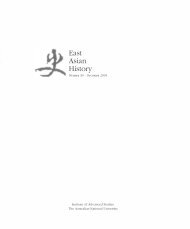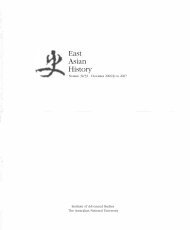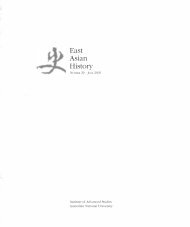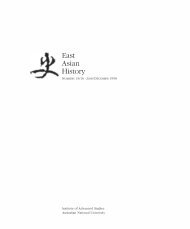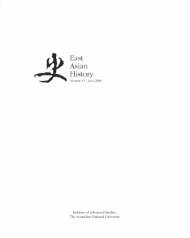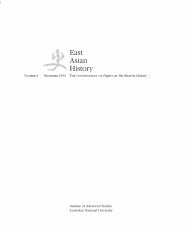Mujaku Dochu (1653-1744) and 17th-Century ... - East Asian History
Mujaku Dochu (1653-1744) and 17th-Century ... - East Asian History
Mujaku Dochu (1653-1744) and 17th-Century ... - East Asian History
Create successful ePaper yourself
Turn your PDF publications into a flip-book with our unique Google optimized e-Paper software.
MUJAKU DOCHU<br />
45<br />
ism, frequently using the phrase, "to see the nature <strong>and</strong> become Buddha".<br />
<strong>Mujaku</strong> asked, "How can this be the 'see the nature <strong>and</strong> become Buddha'<br />
of the Zen School?" Li Cho-wu was an independent thinker who had<br />
been a Confucian but became a monk, his thought being labelled "Wild<br />
Ch'an". His works advocated both nienfo (nembutsu) <strong>and</strong> rebirth in the<br />
Pure L<strong>and</strong>, <strong>and</strong> "seeing the nature" of Ch'an-yet Chu-hung disapproved<br />
of Li's ideas.104 Similarly, <strong>Mujaku</strong> attacked Lin Chao-en *}t 0517-98),<br />
writing that although Lin comprehended the three teachings of Confucianism,<br />
Buddhism <strong>and</strong> Taoism, "if one looks at his Buddhism it is immature,<br />
<strong>and</strong> so [his underst<strong>and</strong>ing of] the other teachings is also immature, , 105<br />
Therefore, <strong>Mujaku</strong> concluded one should specialise in Ch'an or Pure L<strong>and</strong><br />
<strong>and</strong> not mix them:<br />
Chu-hung proclaimed that he transmitted Ch'an <strong>and</strong> also understood<br />
the Vinaya Vehicle, <strong>and</strong> so he wrote the Revelation of the Secrets of the<br />
Sutra of Brahm a's Net (Fan-wang-ching fa-yin Jitf1¥JtiHIlI), which is frequently<br />
in error. Japanese Vinaya scholars have exposed more than one<br />
error in it.106<br />
When he was asked if it were possible to cease this mixing <strong>and</strong> return to<br />
ancient ways, <strong>Mujaku</strong> responded that,<br />
If Confucians only research Confucianism, Buddhists only Buddhism,<br />
Vinayists only Vinaya, <strong>and</strong> Ch'an only Ch'an, then it is almost possible<br />
to be pure. If one is solely devoted to one's own lineage <strong>and</strong> still have<br />
some remaining energy, then one can put it to the study of other schools.<br />
Only then can one be called erudite. 10 7<br />
Later <strong>Mujaku</strong> cited a series of classical works, such as Discourses of the<br />
Warring States (Kuo-yu 'ii-B), Kuo Hsiang's * commentary on the<br />
Chuang tzu, <strong>and</strong> the Hard-Earned Scholarship <strong>and</strong> Records of Findings<br />
(K'un-hsueh chi-wen rnticlj) by Wang Ying-lin 3:,,I)'!1Jl 0223-96) to say<br />
that one should master only one topic or theme.108<br />
These comments encapsulate two major streams in <strong>Mujaku</strong>'s criticisms<br />
of Chu-hung, that he was not learned enough <strong>and</strong> that he mixed Pure<br />
L<strong>and</strong> <strong>and</strong> Confucianism into his Ch'an. These made him too close to <strong>Mujaku</strong>'s<br />
rivals in Japan, the Obaku monks. That Chu-hung's scholarship was<br />
limited, despite the prodigious volume of his writing, is one of <strong>Mujaku</strong>'s<br />
constant refrains.109 It was, in fact, so limited that Japanese Vinayists did<br />
not use his commentary on the Sutra of Brahma 's Net (Fan-wang ching Jit<br />
tiI¥J#.ill:). After praising him for being compassionate <strong>and</strong> intelligent, <strong>Mujaku</strong><br />
remarked:<br />
Alas! Chu-hung had not read the Buddhist books extensively, nor entered<br />
deeply into Buddhist principles, yet he dared to write a book like the<br />
Revelations of the Secrets of the Sutra of Brahma 's Net ... . How could he<br />
have obtained pure [comprehension]? Therefore, I say that none of the<br />
famous scholars of the Ming are the equal of Ch'an Master Yung-chueh<br />
104 Araki, Unsei Shuk8 no kenkyU, pp.195-<br />
99<br />
105 Wa n'un reiu, MSS, 258b.<br />
106 Wa n'un reiu, MSS, 258b.<br />
107 Wa n 'un reiu, MSS, 258b--9a. For the source<br />
of the quote, Chu-ch 'uang san-pi, p.253b-d<br />
under "Li Cho-wu". The attack was made<br />
partly because Li stated the origins of all<br />
things lies in yin <strong>and</strong> yang. Li was a complex<br />
thinker. For his Buddhist <strong>and</strong> other thought,<br />
see Lin Ch'i-hsien, Ii Cho-wu Ii fo -hsueh<br />
yu shih-hsueh [The Buddhist <strong>and</strong> Secular<br />
Studies of Li Cho-wu] (Taipei: Wen-chin<br />
ch'u-pan she, 1982).<br />
108 Wan'un reiu, MSS, 259a-60a; the text by<br />
Chu-hung is the Fan-wang ching chieh-shu<br />
fa-yin, which can be found in HTC Vo1.59.<br />
109 Wan'un reiu, MSS, 50a-b, on the Kao Wang<br />
kuan-shih yin ching [Sutra of AvalokiteSvara<br />
(Revealed to) Kao Wang] MSS, 254b; Kinben<br />
shikai, p.96b, for a few examples.



